Keyword research is a cornerstone to any successful search engine optimization strategy.
But it’s nothing without the proper keyword research tools.
One problem: there are literally hundreds of tools to choose from.
Paid tools. Free tools. Freemium tools. Google tools. Long-tail tools. AI tools. Browser extensions. SERP scrapers. Content graders. Surveys.
Where do you even begin?
Good news: we’ve downloaded, tried, paid, and experimented with hundreds of SEO tools over the years so that you don’t have to.
The result? Of all the tools we’ve used, 13 tools do the job as good (or better) as the rest.
This list is by no means exhaustive. Not even close.
But this list is proven. Not only have these SEO keyword research tools stood the test of time, but the SEO community has embraced and awarded them for their efficacy.
Even better news: you don’t need all of them; you likely only need one or two of them (and most of them are free).
Are you ready?
Let’s explore.
Get brand new SEO strategies straight to your inbox every week. 23,739 people already are!Sign Me Up
1. Ahrefs Keyword Explorer
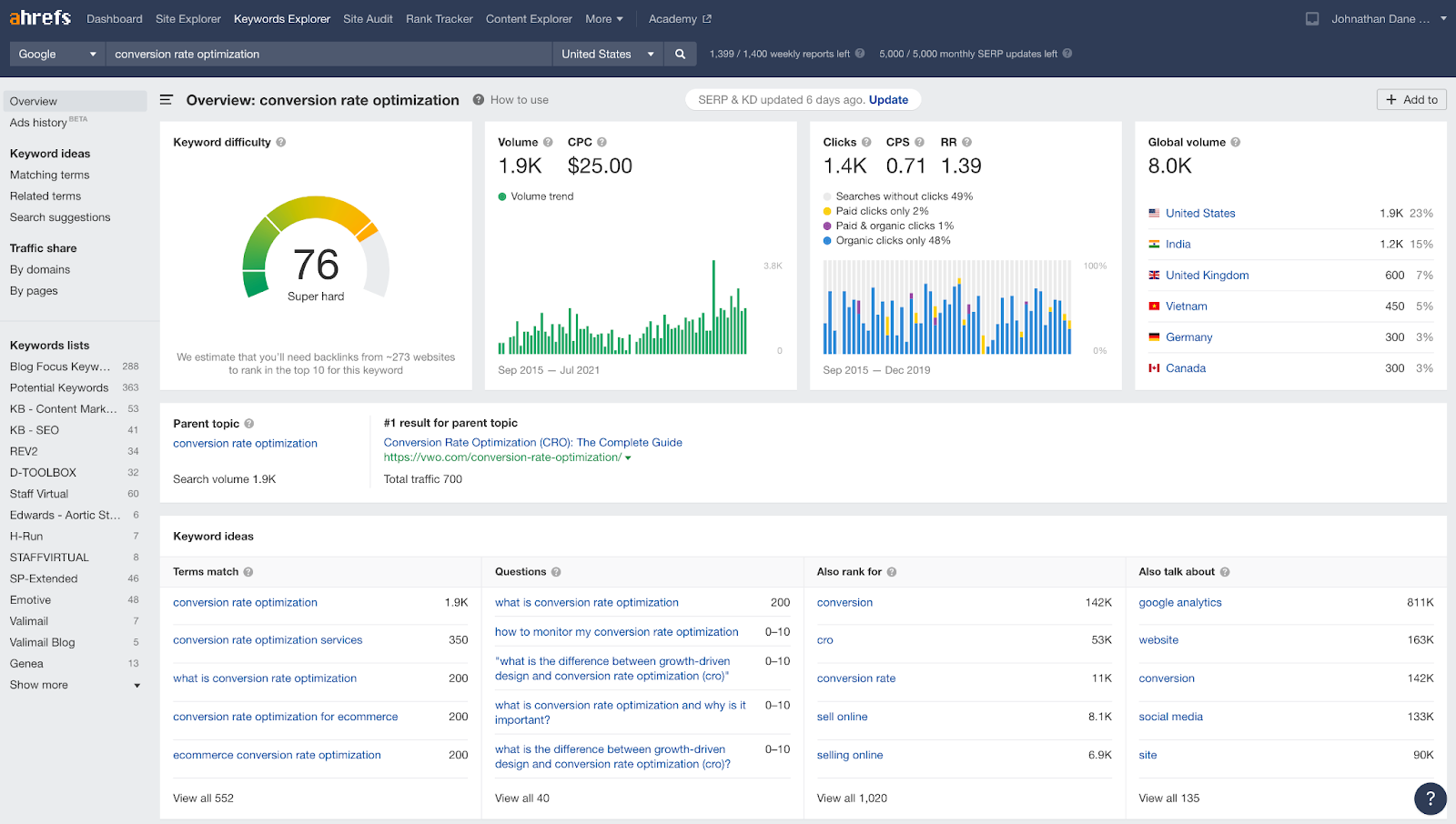
What we love: Parent Topics.
Ahrefs uses a feature called Parent Topics to tell you whether or not you can still rank for your target keyword while pursuing a broader, more popular keyword (parent) instead.
For example, say you want to rank for “conversion rate optimization services.” Ahrefs will tell you that you can pursue “conversion rate optimization agency” (a more popular parent) and still rank for “conversion optimization services.”
Even better: if it determines that Google views two keywords as belonging to different groups, it will tell you that you need two separate pages to rank both.
Bonus features:
- Keyword difficulty score (0-100)
- Clickstream data from 10 different search engines
- Question-based keyword ideas
- Advanced metrics (% of clicks, return rate, clicks per search)
Pricing:
Free version and paid starts at $99/month.
2. SEMRush Keyword Magic
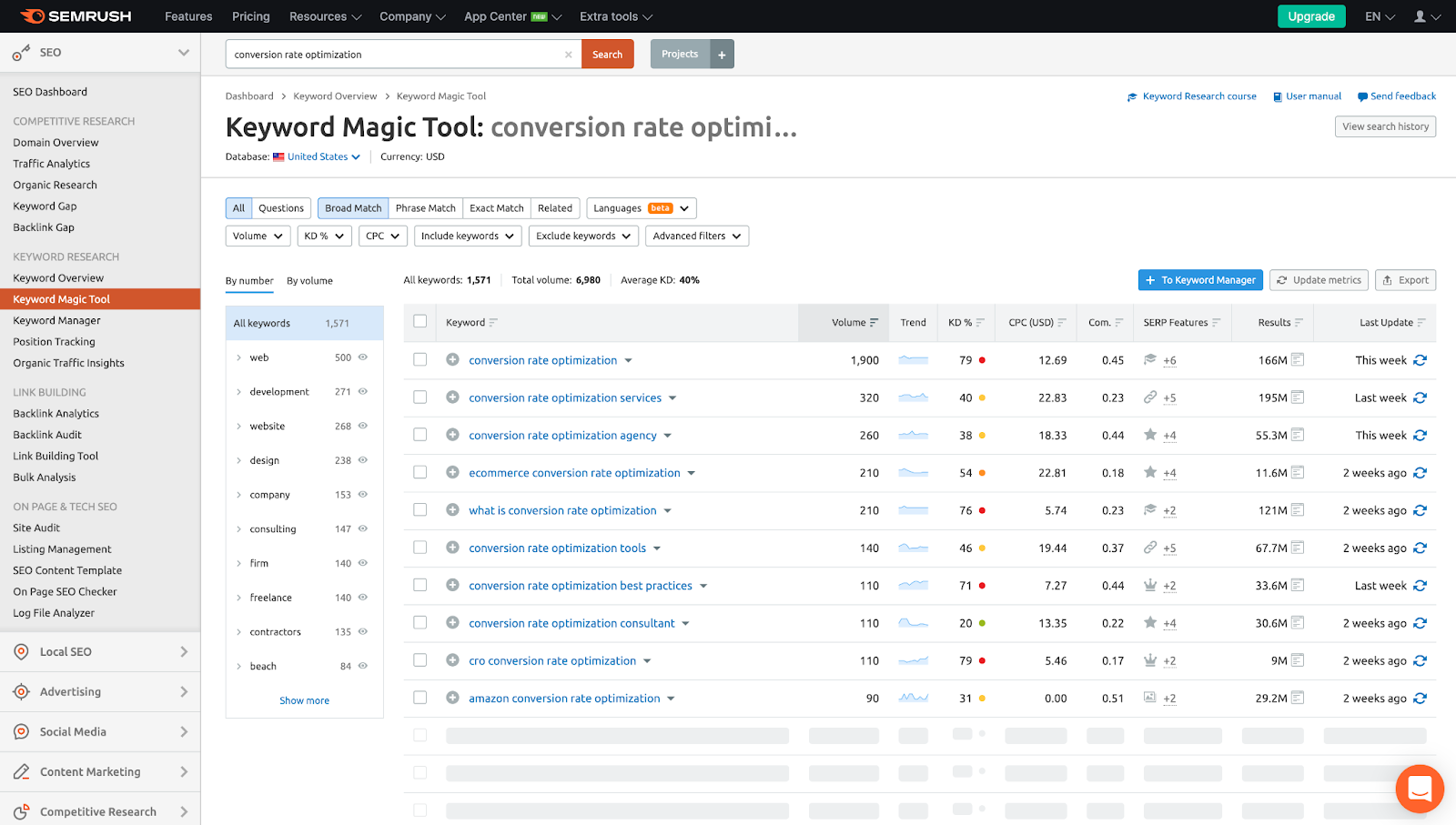
What we love: Keyword Gap.
SEMRush’s Keyword Gap feature lets you compare your domain with a group of competitors to see where you overlap and what you’re missing in regard to keyword rankings. It’s a great way to find relevant keywords your competitors are not ranking for organically.
Bonus features:
- Six different keyword tools (Keyword Overview, Organic Research, Keyword Magic, Keyword Gap, Keyword Manager, and Organic Traffic Insights)
- SERP features (tells you the # of snippets that appear in organic search results)
- Keyword difficulty score
Pricing:
Starts at $119/month.
3. MOZ Keyword Explorer
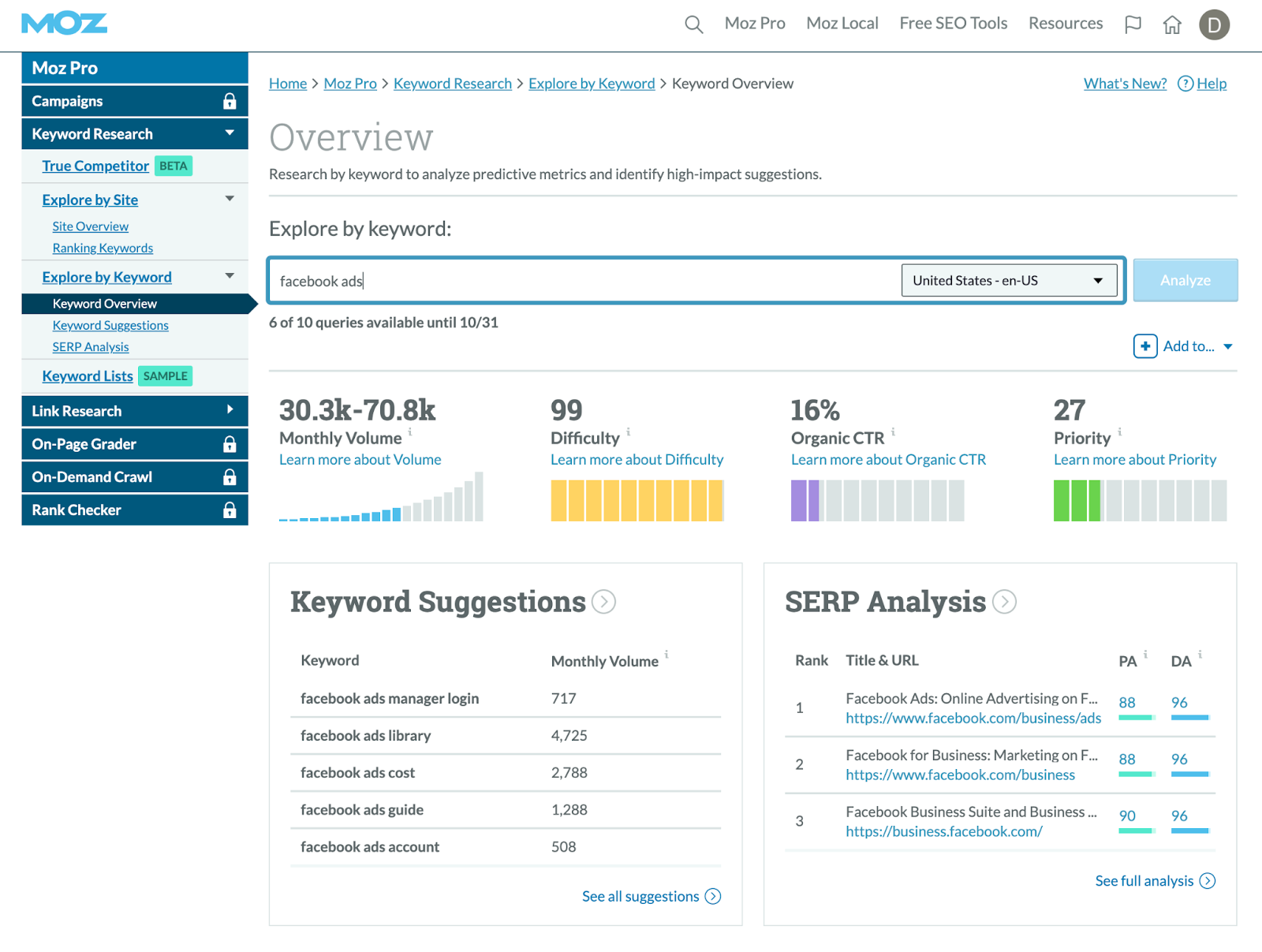
What we love: Domain authority (DA).
Domain authority (invented by MOZ) is a metric that predicts the “ranking strength” of a website based on its backlink profile (quality and quantity of referring domains) and other factors. For example, a DA 90 website has more ranking potential than a DA 15.
DA has become one of the SEO community’s most beloved metrics, and it’s a great way to assess the competition and evaluate ranking difficulty.
Bonus features:
- MOZbar chrome extension (View links, DA, PA directly from SERPs)
- Keyword difficulty score
- Page Authority (like DA, only at the page level)
- Local SEO tools
Pricing:
Free version and paid starts at $99/month.
4. KeywordTool.io
What we love: Autocomplete.
KeywordTool.io uses different search engines’ autocomplete keywords to populate its new ideas and recommendations.
What's autocomplete? When you start typing in a query on Google, it populates a drop-down menu with suggested keywords (or related keywords). That’s autocomplete.

All major search engines use autocomplete suggestions, including YouTube, Bing, and Instagram.
Autocomplete is a great way to find long-tail keywords (more specific search terms with 3+ words) that are less competitive and more rankable. It’s also a great way to see how people are searching for the topics you want to rank for since auto-complete suggestions come from popular search queries related to your specific keyword.
Bonus features:
- Keyword data from multiple platforms: Google, YouTube, Bing, Amazon, eBay, Instagram, PlayStore, Twitter
Pricing:
Free version and paid starts at $69.99/month.
5. Mangools KWFinder
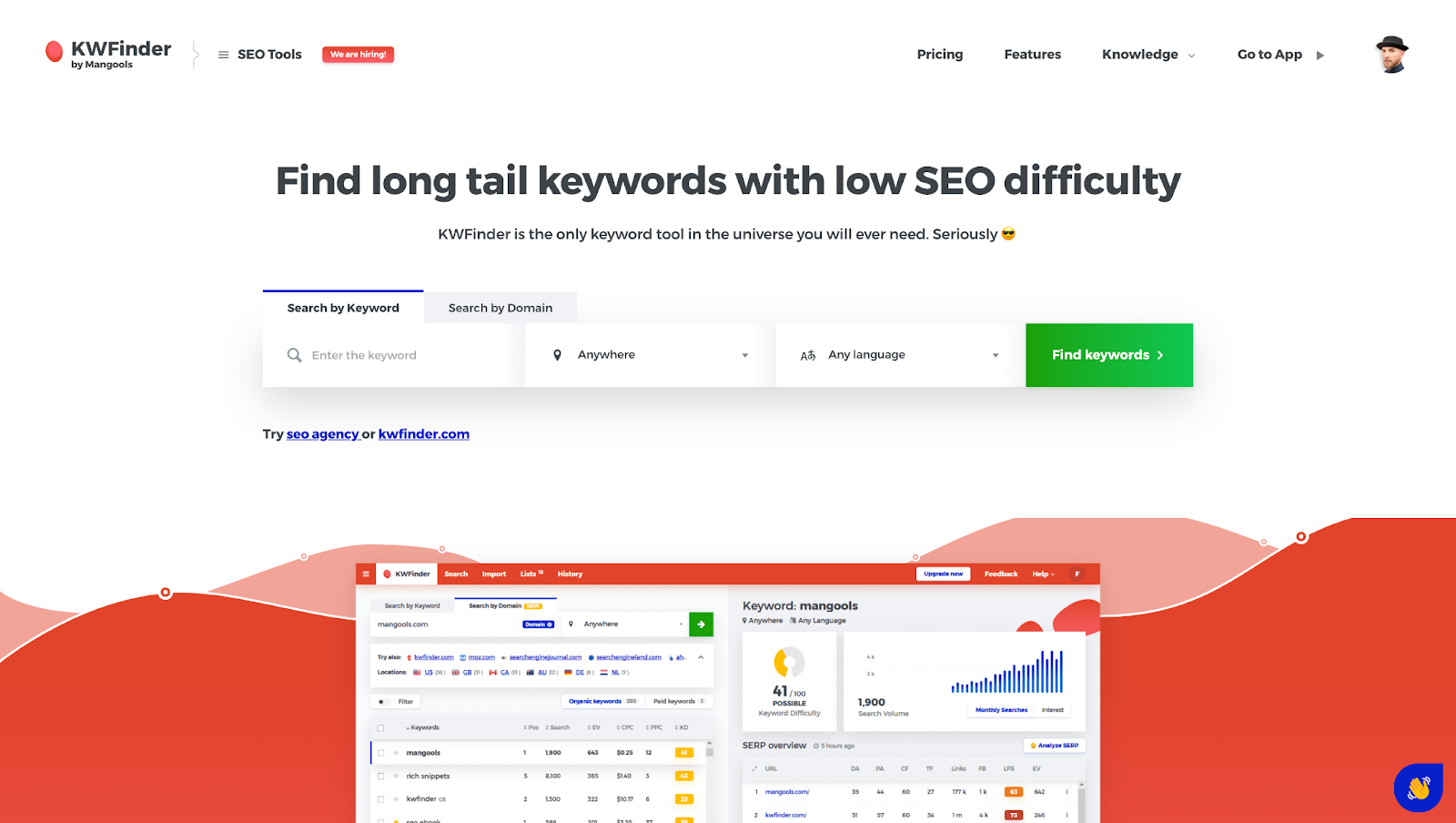
What we love: Keyword difficulty.
Many tools include a keyword difficulty score, but Mangools’ KWFinder claims to be the most accurate since they use a combination of metrics from MOZ, Majestic and proprietary data to predict difficulty.
What metrics do they use? Domain authority, page authority, citation flow, and trust flow. Together, they provide the most accurate keyword difficulty score of all the SEO tools.
Bonus feature:
- Question-based keyword suggestions
- Filters (easily modify keyword searches based on criteria)
- Local keyword research
Pricing:
Free version and paid starts at $29/month.
6. Google Keyword Planner
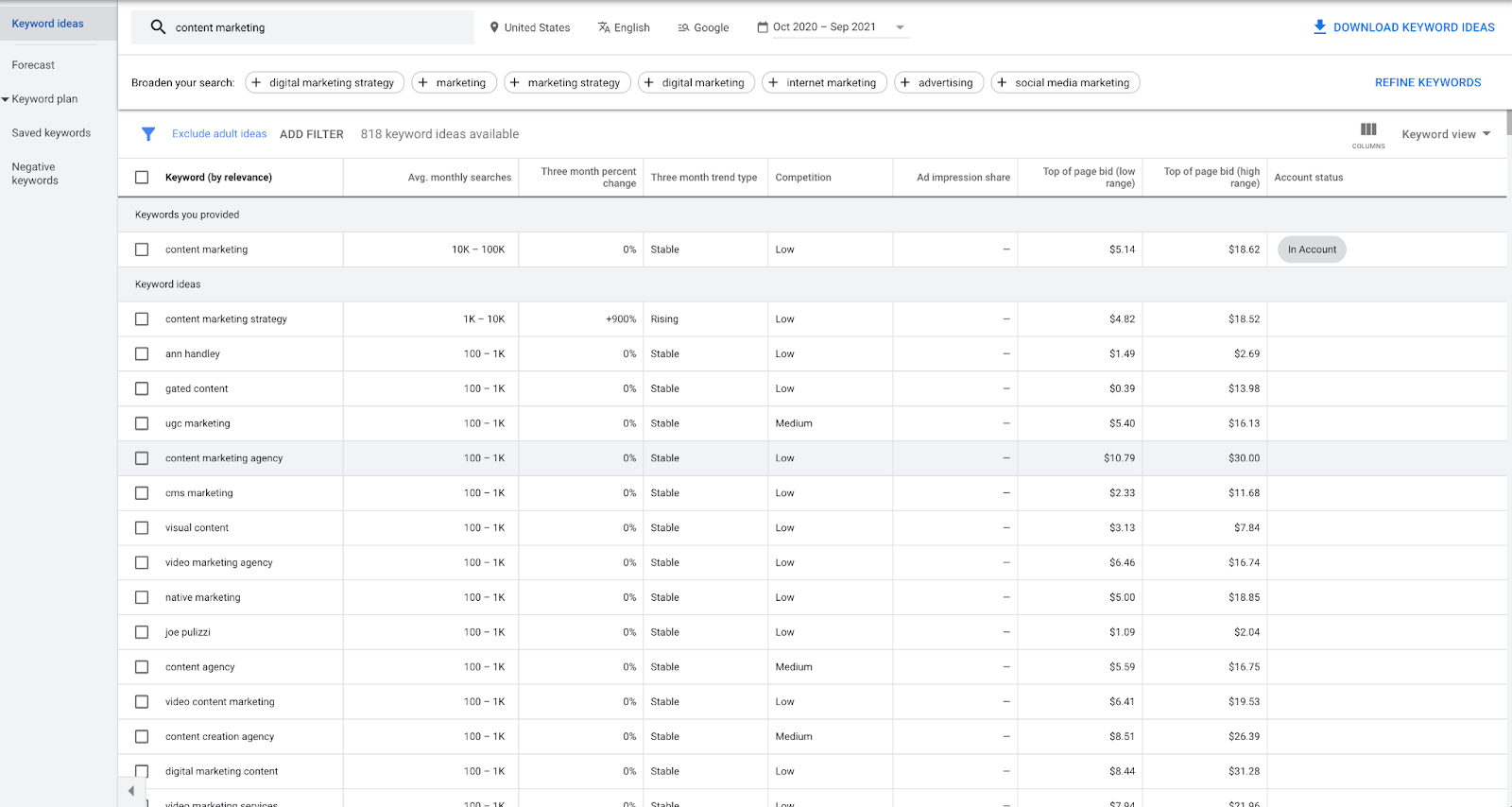
Keyword Planner is Google’s free keyword tool built into every Google Ads (formerly Google Adwords) PPC account. To use it, you need to set up a Google Ads account first (also free).
What we love: search volume estimates.
All traditional keyword tools offer estimated monthly search volume for keywords. However, this data is usually inaccurate. Why? Because Google doesn’t share precise search volume data anymore. Instead, SEO tools estimate monthly search volume based on the ranges Google does provide. But since those ranges are so broad (e.g. “1K-100K monthly searches”), it’s difficult to predict an exact number.
With Keyword Planner (and a little workaround), you can get a more accurate estimate of search volume, which will help you make better decisions about which keywords to pursue and prioritize.
How? We detailed the entire process, step by step, right here.
Bonus features:
- Data comes directly from the source (Google)
- “Top of Bid” feature: You can see what people are paying for certain keywords, which allows you to estimate the commercial intent of a keyword and calculate the worth of your organic traffic
Pricing:
Free 😎. You just need to make a Google Ads account, which is also free.
7. Google Search Console
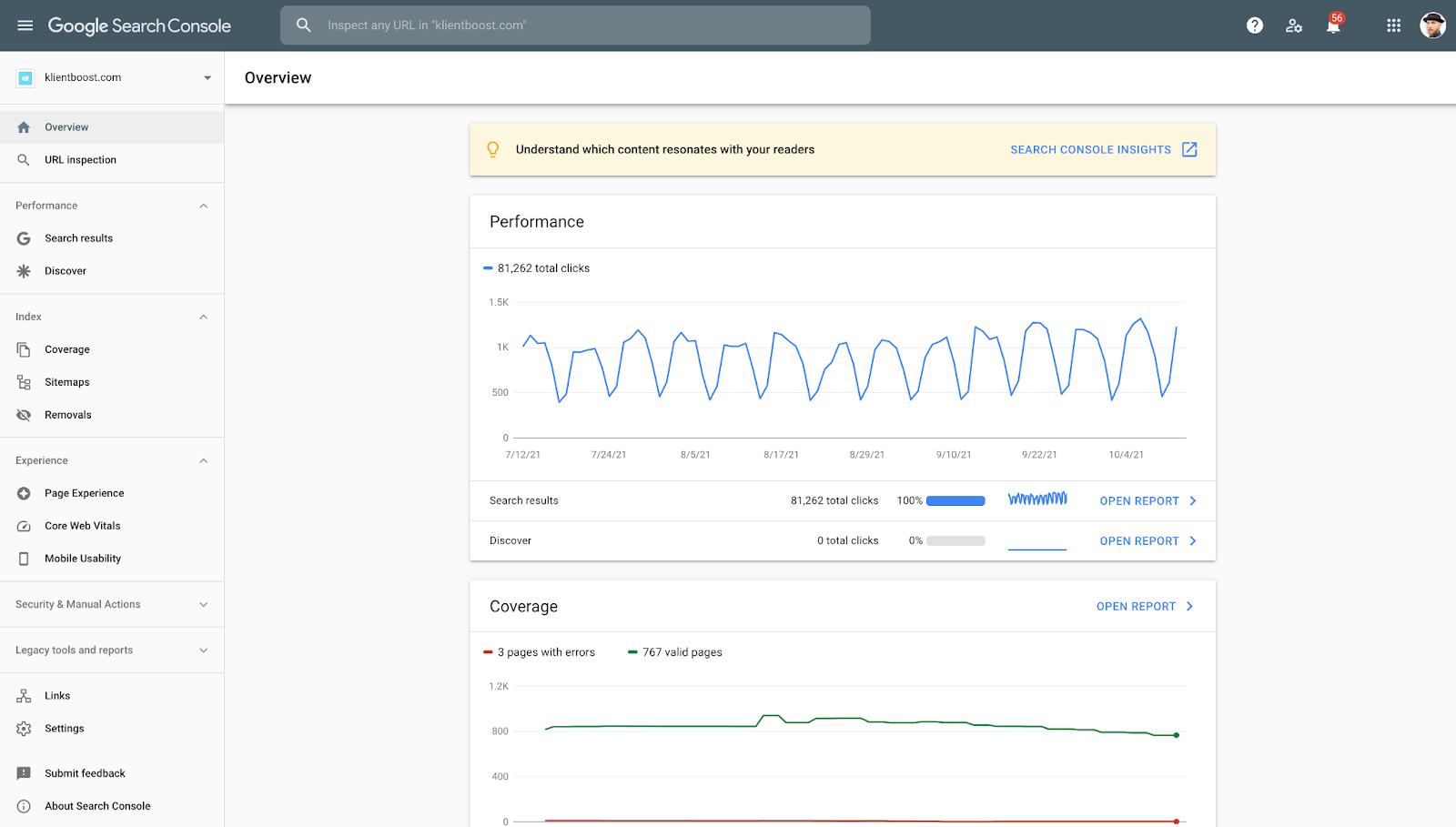
Google Search Console (free) is a suite of tools and reports that help measure your site’s search performance.
What we love: performance report.
Your performance report inside Search Console will tell you exactly how many impressions each page received, how many clicks each page received (click-through rate or CTR), and what position you rank for different keywords.
Using this data, you can determine which pages rank for which keywords, which pages and keywords need a little more love to get to the top of page one, and which pages need better meta descriptions and titles (to increase click-through).
Bonus features:
- Links to Google Analytics to give you 360 data on keywords
- Site usability alerts
- Link profile (external and internal)
Pricing:
Free 😎.
8. Google Trends
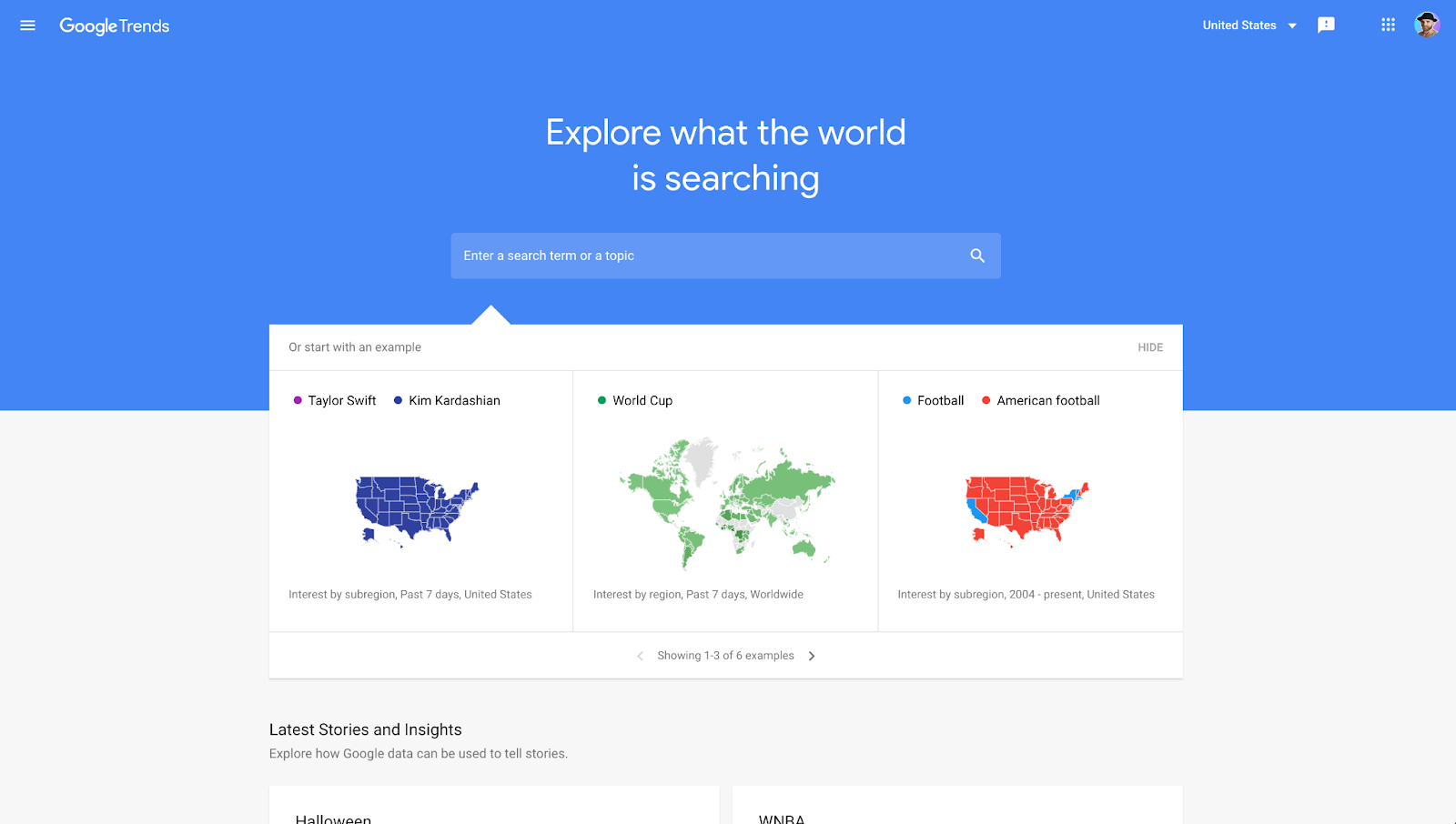
What we love: historical trends.
Google Trends provides a historical timeline of a keyword’s popularity in search. It also lets you compare up to five different keywords, side by side, to see which is more popular and which is trending up or down.
Why is this helpful?
When comparing two keywords, Trends allows you to see which keyword is gaining steam. The last thing you want to do is rank for a keyword that is declining in popularity.
Also, since Keyword Planner only provides monthly search volume averages, Trends shows you if any of that search traffic is seasonal.
For example, Google may tell us that “American Football” receives 200K monthly searches. But upon closer inspection, you’ll see that those searches peak between August and December, which means that August-December receives much more than 200K searches, whereas Feb-July receives far fewer.
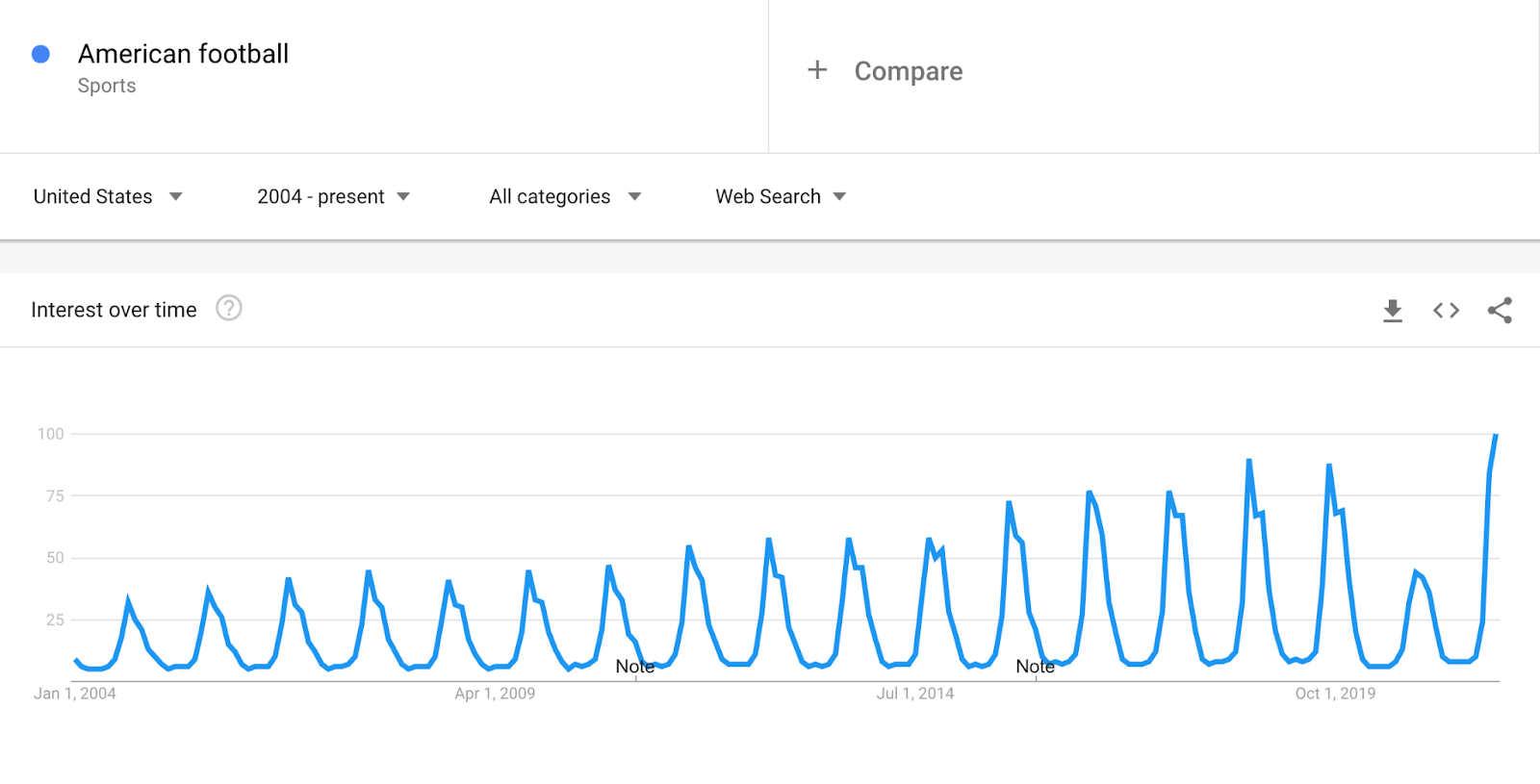
Bonus features:
- Related search suggestions
- Related topic suggestions
- YouTube keyword search
Pricing:
Free 😎.
9. Answer the Public

What we love: question-based suggestions.
Like KeywordTool.io, Answer the Public also uses autocomplete suggestions to formulate its keyword recommendations, but Answer the Public does a better job of grouping suggestions into digestible sections and categories. Also, the UX is phenomenal.
As for recommended keywords in the form of questions, they further group keywords into 10 categories:
- Who
- What
- When
- Where
- Why
- Are
- Can
- Will
- Which
- How
Why are question-based keywords so great? First, they’re long-tail keywords with specific intent (it makes it easy to answer when you know exactly what someone is asking). Second, questions make for great subheadings within articles.
Bonus feature:
- Robust data
Pricing:
Free version and Pro version starts at $99/month
10. ClearScope.io

What we love: content grades.
Clearscope is, well, amazing. It’s a word editor that ensures your content is supremely relevant based on the keywords you’re targeting.
How? Content grades.
Clearscope has a “terms” section inside of its editor. Terms are keywords topically clustered with your target keyword (i.e. semantic keywords). For example, if your target keyword is “keyword research tools,” a topically clustered term would be “SEO.” In other words, any reasonable article about keyword research would expect to include the word SEO in it.
Clearscope uses terms to formulate topic models and grade relevance—the fewer terms included in the article, the less relevant, the lower your content grade.
Based on how well your article explores the keyword terms it suggests, Clearscope will give you a grade. For example, C+ or A+ or F.
Not only do content grades help you incorporate the entire family of keywords associated with your target keyword, but they help you plan your articles too. For example, you can use terms to outline your article with relevant keywords (a content marketers dream).
Bonus features:
- Readability scores
- Suggested word count
- Question-based suggestions
Pricing:
Starts at $170/month.
11. Keywords Everywhere
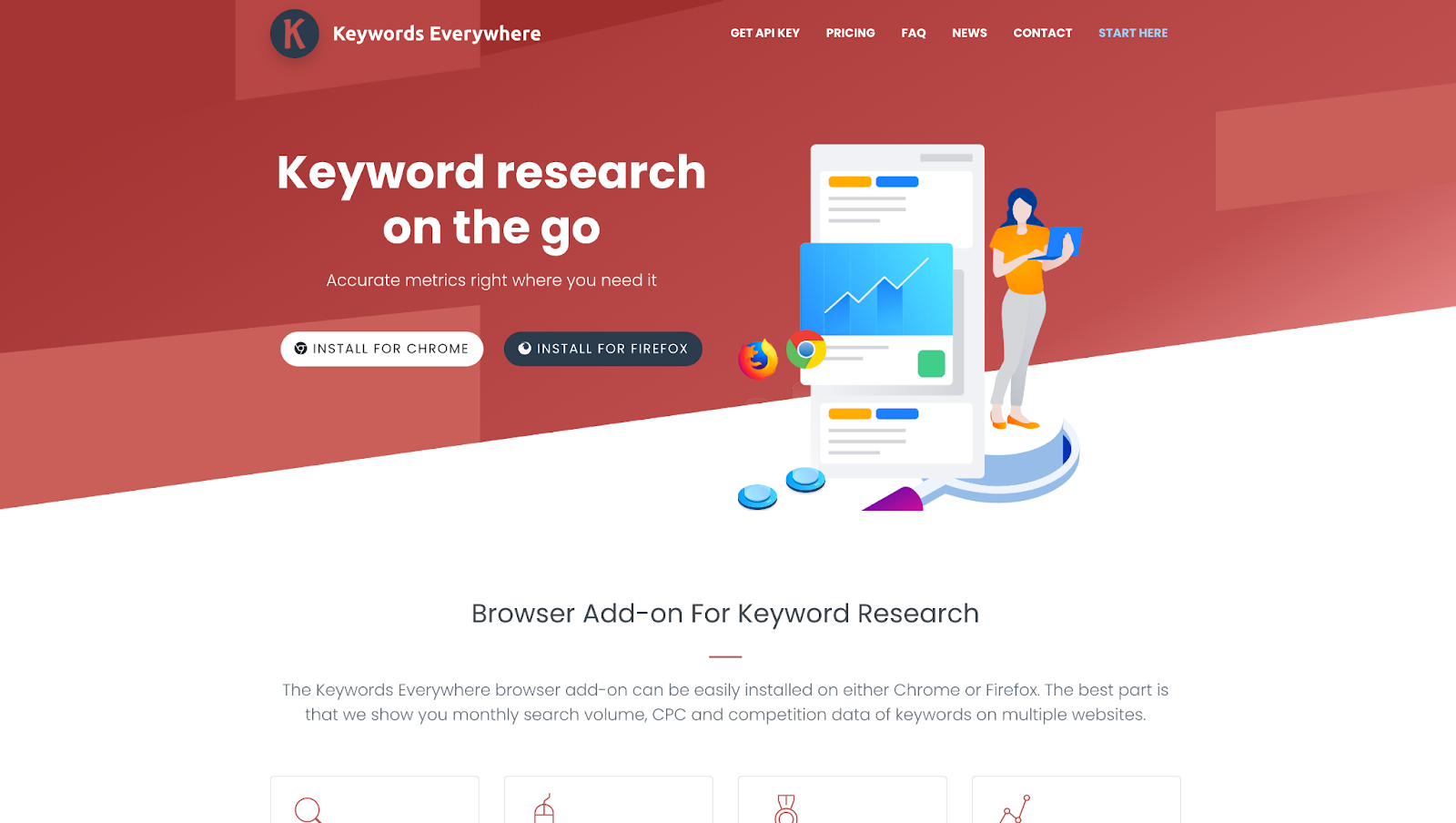
What we love: browser add-on.
That’s right, Keywords Everywhere is a browser extension (Firefox and Chrome).
With Keywords Everywhere, you can see related searches, search volume data, and historical trends directly from within Google’s SERP. No need to bounce back into a tool.
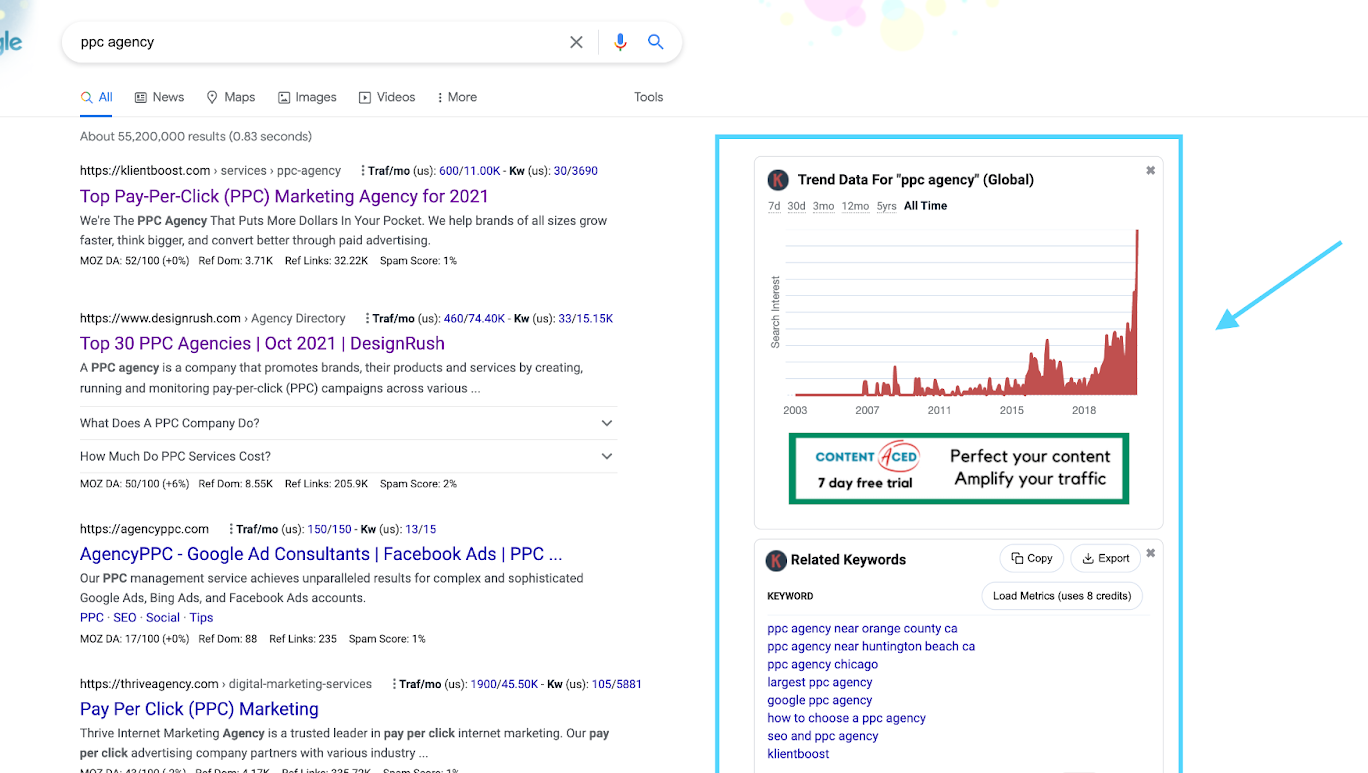
Bonus features:
- Long-tail keywords
- Related keywords
- “People also searched” keywords
Pricing:
Free version and paid starts at $10 for 100,000 keywords.
12. Seed Keywords

What we love: surveys.
Unlike any other keyword tool, Seed Keywords uses surveys (like, real surveys to real people) to find keyword recommendations.
How? First, the tool lets you describe a problem scenario related to your product or service. Second, it gives you a link to the scenario so you can share it with real people (customers, friends, contacts). Last, it asks your contacts to type the keywords they would use to find the solution to the problem scenario. From there, you can export the list of keywords real people used to investigate the problem you solve.
Bonus features:
- Really freakin’ cool
Pricing:
Free 😎.
13. Keyword Keg

What we love: Merge words.
KeywordKeg has five simple tools: Find keywords, Import keywords, Related keywords, People also ask for keywords, and Merge words.
Merge words lets you input a ton of keywords, then generates all the different combinations of those keywords as new keyword ideas.
Why is this important? eCommerce. For online shops with loads of product variants like colors, sizes, and shapes, you can easily find all the different variants of keywords without generating combinations yourself.
Bonus features:
- Search multiple seed keywords at once
- Filter keywords based on purchase intent
- 11 search engines used to populate suggest keywords
Pricing:
Starts at $38/month.
Closing thoughts
There are hundreds of great keyword research tools available today.
Heck, we didn’t even mention time-tested tools like SerpStat, Ubersuggest, Soovle, Raven Tools, Majestic, Long-tail Pro, or SpyFu.
Not to mention the best tool of them all: your frontline teammates.
Salespeople. Customer service. Online support. Account managers.
Every customer-facing employee on your team has a treasure trove of keyword data in their heads waiting to get out.
Bottom line: the best keyword research tool comes down to preference.
It doesn’t matter which combination of tools you choose, just as long as you can collect the following data needed to pick and prioritize the right keywords:
- Estimate search volume
- Analyze search trends
- Asses ranking difficulty
- Estimate clicks/traffic
- Identify searcher’s intent
- Formulate a content strategy
Did we leave your favorite keyword analysis tools off the list? If so, which is it?
